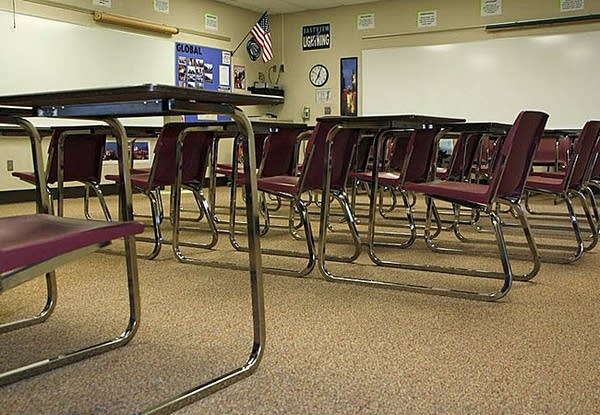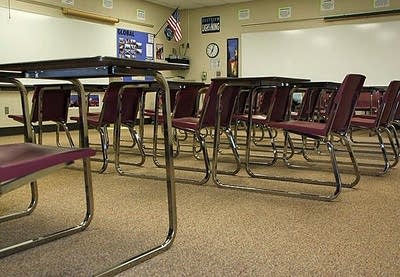Public schools anxious over possible government shutdown

School employees are not state workers, but their salaries and other school expenses rely on money that districts get from the state. So, one question surrounding a possible government shutdown is whether public schools in Minnesota would continue to receive state payments.
There is precedent to suggest they would. But without any definitive ruling yet on the question this year, school leaders are drawing up contingency plans.
Gov. Mark Dayton, a Democrat, and Republican leaders of the state Legislature are at a stalemate over a new state budget and how to close a $5 billion deficit. Dayton wants to raise income taxes on the top 2 percent of earners, while Republicans want to solve the deficit with budget cuts alone.
If they can't reach an agreement before the end of the month, many of state government's functions would need to shut down on July 1 because they wouldn't be funded after that date.
Create a More Connected Minnesota
MPR News is your trusted resource for the news you need. With your support, MPR News brings accessible, courageous journalism and authentic conversation to everyone - free of paywalls and barriers. Your gift makes a difference.
"The fact that we're not hearing anything, and no movement's been made -- it's making me very nervous," said Colleen Mertesdorf, finance director for the Faribault school district in southern Minnesota.
Mertesdorf is nervous because she hasn't heard from the state Education Department on whether payments to schools would continue if the state government shuts down July 1.
"We've never gone without state aid," she said. "If we don't have state aid coming in on July 1, that's new territory."
"If we don't have state aid coming in on July 1, that's new territory."
Mertesdorf is also president of the Minnesota Association of School Business Officials, which represents all school budget officers in the state. She says the concern centers around cash flow -- if state money dries up, will she be able to meet payroll and keep paying bills?
Without any guidance from the state so far this year, Mertesdorf and others have looked to the state's last shutdown for some clues.
In 2005, a specially appointed judge granted the Pawlenty administration's request to continue most school funding. These rulings were outlined in two memos sent to schools that year by then-Education Commissioner Alice Seagren.
Attorney General Lori Swanson filed a petition Monday asserting that education should be among the core functions of government to be funded during a shutdown. She cited the Minnesota Constitution's requirement that the state fund a public school system.
So far, Gov. Dayton's administration has not indicated what functions it will ask to be considered essential, but that list will be in the governor's own petition expected to be filed later this week.
Scott Croonquist, executive director of the Assocation of Metropolitan School Districts, is telling his members to plan accordingly.
"I think there's a growing awareness among superintendents and school boards that they better not just assume that the actions that were taken in 2005 will automatically be the same course that we will take this time around," said Croonquist.
At least one lawmaker thinks the process used in 2005 is unconstitutional. Rep. Ryan Winkler, DFL-Golden Valley, says judges shouldn't be determining who gets money. He adds that the state Constitution prohibits any funds from being spent that haven't been appropriated.
Croonquist is telling districts to consider applying for lines of credit or short-term borrowing to meet cash needs. Districts already have been borrowing more in recent years because the state has used delayed payments to balance its own budget.
The Brainerd school district in central Minnesota is scheduled to get $6 million from the state in July. Brainerd superintendent Steve Radzillo has a borrowing agreement with a local bank, but it only covers $2 million.
"If we need to say we need another $4 million, they're going to have to go through their underwriting process over again and their rates won't be as competitive," said Radzillo. "And we'll pay more -- maybe another $10,000 or 15,000 over what we're already paying."
That extra payment would be interest on the loan, which Radzillo says would probably never be recovered, regardless of when a state budget deal comes.
Still, it's unlikely that students themselves would see tangible effects of a shutdown, unless it carries into late summer. Officials we spoke to at several districts today said summer school is still on for now, as are summer food programs.
The Minnesota Department of Education declined a request for an interview, but spokeswoman Charlene Briner said in an email that officials are still evaluating the impact of a shutdown on schools.
She also said the courts will ultimately determine what's a critical service, so until that point, anything else is speculation.
